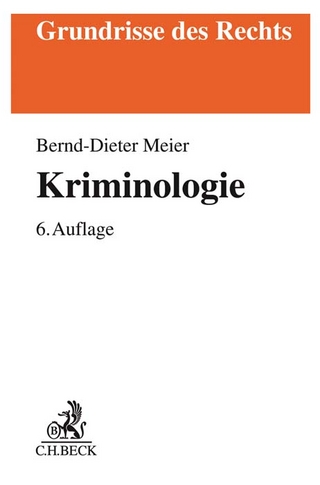
White-Collar Crime
Routledge (Verlag)
978-1-138-28889-8 (ISBN)
White-Collar Crime: An Opportunity Perspective analyzes white-collar crime within a coherent theoretical framework. Using the opportunity perspective, which assumes that all crimes depend on offenders recognizing an opportunity to commit an offense, the authors uncover the processes and situational conditions that facilitate white-collar crimes. In addition, they offer potential solutions to this persistent and widespread social problem without being reductive in their treatment of the difficulties of control.
With this third edition, Benson and Simpson have added substantive online teaching materials and expanded their coverage with up-to-date case studies and discussions of recent investigations into white-collar crime and control. These timely updates reaffirm this accessible and rigorous book as a core resource for courses on white-collar crime.
Michael L. Benson is Professor of Criminal Justice at the University of Cincinnati. He has published extensively on white-collar and corporate crime in leading journals, including Criminology, Justice Quarterly, Journal of Research in Crime and Delinquency, American Sociological Review, American Journal of Sociology, and Social Problems. He is a Fellow of the American Society of Criminology and a former President of the White-Collar Crime Research Consortium of the National White-Collar Crime Research Center, and the 2017 recipient of the Gilbert Geis Lifetime Achievement Award from the Division on White-Collar and Corporate Crime of the American Society of Criminology. He received the Outstanding Scholarship Award from the Society for the Study of Social Problems Division on Crime and Juvenile Delinquency for his book, Combating Corporate Crime: Local Prosecutors at Work. In 2016, he co-edited The Oxford Handbook on White-Collar Crime with Shanna R. Van Slyke and Francis T. Cullen. His research has been funded by the National Institute of Justice, the Centers for Disease Control, and private research foundations. He is currently writing a monograph on Emotions in Crime and Criminal Justice. Sally S. Simpson is Professor and Chair of the Department of Criminology and Criminal Justice at the University of Maryland, College Park and Director of the Center for the Study of Business Ethics, Regulation, & Crime. Simpson is a Fellow of the American Society of Criminology, a Distinguished Scholar named by the ASC Division on Women and Crime, and the 2013 recipient of the Gilbert Geis Lifetime Achievement Award from the National White-Collar Crime Center and the White-Collar Crime Research Consortium. She is past President of the White-Collar Crime Research Consortium. Author of more than 60 articles and chapters along with five books, Simpson is Principal Investigator on a National Institute of Justice funded research project that examines the relationship between corporate board diversity and company participation in accounting fraud and bribery, environmental violations, and anti-competitive behavior.
Preface to the Third Edition. Preface to the Second Edition. Preface to the First Edition. Acknowledgements. Part I—White-Collar Crime: Introduction and Overview. Chapter 1 – What Is White-Collar Crime? Chapter 2 – Who is the White-Collar Offender? Part II—Criminological Theory and the Opportunity Perspective. Chapter 3 – Explaining White-Collar Crime: Traditional Criminological Theories. Chapter 4 – Explaining White-Collar Crime: The Opportunity Perspective. Part III—Applying the Opportunity Perspective to White-Collar Crime. Chapter 5 – Financial Crimes in Health Care, Mortgages, Securities, and Markets. Chapter 6 – Corporate Violence: Environmental, Workplace, and Manufacturing Offenses. Part IV—The Symbolic Construction and Social Distribution of Opportunities. Chapter 7 – The Symbolic Construction of Opportunity: Neutralization, Moral Disengagement, and Normalization of Deviance. Chapter 8 – The Social Distribution of Opportunity: Class, Gender, and Race. Part V—Control, Prevention, and the Future of White-Collar Crime. Chapter 9 – Legal Controls: The Criminal Justice, Regulatory, and Civil Justice Systems. Chapter 10 – Opportunities and Situational Prevention of White-Collar Crime: Using Legal and Extralegal Controls. Chapter 11 – Opportunities and the Future of White-Collar Crime. References. Index.
| Erscheinungsdatum | 17.02.2018 |
|---|---|
| Reihe/Serie | Criminology and Justice Studies |
| Zusatzinfo | 6 Tables, black and white; 7 Line drawings, black and white; 7 Illustrations, black and white |
| Verlagsort | London |
| Sprache | englisch |
| Maße | 187 x 235 mm |
| Gewicht | 521 g |
| Themenwelt | Recht / Steuern ► EU / Internationales Recht |
| Recht / Steuern ► Strafrecht ► Kriminologie | |
| Sozialwissenschaften ► Soziologie | |
| ISBN-10 | 1-138-28889-6 / 1138288896 |
| ISBN-13 | 978-1-138-28889-8 / 9781138288898 |
| Zustand | Neuware |
| Haben Sie eine Frage zum Produkt? |
aus dem Bereich



